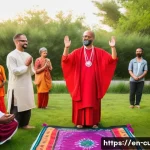The intersection of cults and international law is a labyrinth of human rights, religious freedom, and state sovereignty. It’s a topic that has captivated my attention for years, especially as we see the digital landscape transform how these groups operate and expand globally.
I’ve often wondered how governments worldwide grapple with protecting their citizens from insidious manipulation while upholding fundamental liberties, a challenge made even more complex when cults operate across borders, making legal matters incredibly intricate.
Recent events have highlighted a disturbing trend: social media has become an alarmingly effective recruitment tool for high-control groups, often targeting vulnerable individuals with curated aesthetics and promises of belonging.
It truly makes you think about the evolving nature of influence and manipulation in our interconnected world. We’ve seen cases, like the recent conviction of a Kansas-based cult for forced labor, bringing to light the severe human rights abuses that can occur within these organizations.
And when these groups engage in political activities or financial exploitation, the lines between religious practice and criminal enterprise blur, creating significant legal tension for nations struggling to find a balance.
This isn’t just about faith; it’s about the profound impact on individuals, families, and even international relations. It raises crucial questions about where protection ends and persecution begins, particularly when international human rights instruments are involved.
The legal implications are vast, touching on everything from human trafficking and organized crime to tax evasion and immigration status. Plus, the very definition of a “cult” itself remains a contentious issue in legal frameworks across different countries, further complicating efforts to regulate or intervene.
It’s a delicate dance between defending basic freedoms and safeguarding public safety. I can’t help but feel a sense of urgency when I consider how quickly these situations can escalate and how devastating the consequences can be for those caught in their grip.
It’s a global issue demanding global understanding and cooperation. Let’s delve deeper into the fascinating and often unsettling world of cults and international law to truly understand the complexities and the ongoing quest for justice.
The Digital Web: How High-Control Groups Cast Their Nets Online

It’s truly astounding, and frankly, a bit unsettling, how the digital age has completely reshaped the landscape for groups that seek to exert extreme control over individuals. I remember a time when recruitment largely happened through physical interactions, word-of-mouth, or perhaps flyers. Now, it’s all happening in plain sight, yet often unseen, across social media platforms. From meticulously crafted Instagram feeds promising spiritual enlightenment to seemingly innocent TikTok videos hinting at a utopian community, these groups have mastered the art of online seduction. They prey on our innate human desire for belonging, purpose, and connection, often targeting those feeling isolated, vulnerable, or searching for answers in a complex world. They’re not just looking for followers; they’re looking for deeply personal connections to exploit. I’ve personally scrolled through posts that, at first glance, seem perfectly harmless, even inspiring, only to dig a little deeper and find a troubling undercurrent of ideological rigidity and demands for absolute loyalty. It’s a stark reminder that what we see online isn’t always what it seems, and the curated perfection often masks a much darker reality.
The Allure of Curated Digital Identities
One of the most potent tools in their arsenal is the creation of incredibly appealing, often aspirational, online personas and communities. They build a narrative of exclusivity and higher purpose, using visually stunning content that promises a life free from modern anxieties. Think about it: a picture of a serene, communal living space, a quote about finding inner peace, or a video showcasing a tight-knit group laughing together. These aren’t accidental; they’re strategically designed to evoke a strong emotional response. I’ve seen countless examples where individuals are drawn in by the aesthetic, only to find themselves slowly ensnared by manipulative tactics once they’ve engaged. It’s a slow burn, a gradual erosion of critical thinking, often masked by an overwhelming sense of acceptance and love. This digital “love bombing” is incredibly effective because it bypasses many of the traditional warning signs we might look for in a face-to-face interaction, making it far more insidious and difficult to detect from the outside.
Spotting the Subtle Red Flags in Your Feed
So, how do we protect ourselves and our loved ones when the lines are so blurred? It comes down to cultivating a healthy dose of skepticism and paying attention to subtle cues. If a group or individual online seems too good to be true, promises instant solutions to complex problems, or demands an unusual level of commitment very early on, those are significant red flags. I always advise people to look for an excessive focus on a single, charismatic leader, a narrative that demonizes the outside world, or a constant pressure to donate money or time without clear transparency. Another tell-tale sign I’ve noticed is a strong discouragement of questioning or independent research, often accompanied by a push to only consume information from within their specific echo chamber. It’s about more than just content; it’s about the underlying philosophy and the way they interact with dissent or external viewpoints. Staying informed and trusting your gut feeling are perhaps our best defenses in this evolving digital battlefield.
When Ideals Fracture: Unpacking Human Rights Abuses Within These Organizations
It’s heartbreaking, truly, to witness the journey of someone who enters one of these groups seeking betterment, only to find themselves stripped of their autonomy and basic rights. The stories I’ve encountered, both through research and directly from survivors, paint a chilling picture of systematic human rights abuses. We often think of “cults” as fringe religious groups, but the reality is far broader, encompassing everything from self-help seminars that turn coercive to seemingly innocuous lifestyle movements. The common thread is the gradual erosion of individual freedom, leading to situations where people are subjected to forced labor, financial exploitation, and severe psychological manipulation. The recent conviction of that Kansas-based group for forced labor really brought home the fact that these aren’t just abstract concepts; they are real, tangible crimes with devastating consequences for the victims. It’s not just about what they believe, but what they *do* to maintain control, and that’s where the international legal framework truly needs to step in.
The Hidden Toll of Forced Labor and Financial Exploitation
When people join these groups, they often start by contributing voluntarily, eager to be part of something bigger. But over time, that contribution can morph into something far more sinister: forced labor. I’ve heard accounts of individuals working grueling hours with no pay, being told their efforts are for a higher purpose or their “spiritual development.” Their passports might be confiscated, their communication with family severed, and their wages, if any, funneled directly back to the group. Financially, it’s a similar story. Initial donations can escalate into demands to hand over life savings, property, and inheritances. I remember one survivor telling me how they were pressured to take out loans they couldn’t repay, all for the “greater good” of the organization, leaving them utterly destitute and dependent. The economic implications are staggering, not just for the individuals but for society at large, as these groups often operate outside of traditional financial regulations and tax structures, creating a black hole of accountability.
The Unseen Wounds: Psychological Manipulation and Control
While physical abuse and financial ruin are often the most visible scars, the psychological impact is arguably the most profound and long-lasting. The constant gaslighting, the systematic dismantling of self-worth, and the creation of a completely new reality within the group can leave victims utterly disoriented and traumatized. I’ve seen how former members struggle with debilitating anxiety, depression, and a profound sense of betrayal. It’s a complete rewiring of their minds, making it incredibly difficult to trust their own judgment, let alone others. The control is so pervasive that it dictates everything from what they wear and eat to who they can speak with and what they’re allowed to think. This isn’t just about belief; it’s about breaking down an individual’s identity and rebuilding it in the image of the group, leaving deep, unseen wounds that can take years, sometimes decades, to heal. It’s a testament to the human spirit that so many survivors manage to reclaim their lives after such profound abuse.
Navigating the Labyrinth: State Sovereignty Versus Citizen Protection
This is where things get incredibly complicated, and it’s a challenge I’ve grappled with in my own understanding of international law. Governments, by their very nature, are tasked with protecting their citizens. Yet, they also have a fundamental obligation to uphold religious freedom and freedom of association. When does a “religious group” cross the line into a “high-control group” or even a “criminal enterprise”? And who gets to decide? This tension creates a very delicate balancing act. On one hand, you have the state’s duty to intervene when human rights are being violated, or public safety is at risk. On the other, there’s the danger of infringing on legitimate religious practices or being accused of persecution. I’ve often thought about how different countries approach this. Some, like France, have taken a more interventionist stance, actively monitoring and regulating groups perceived as dangerous. Others, like the United States, lean heavily on the First Amendment, making intervention much more challenging until clear criminal acts can be proven. This patchwork approach means that groups can often exploit legal ambiguities by moving their operations across borders, effectively playing one nation’s laws against another’s.
The Elusive Definition of “Cult”: A Global Quagmire
Perhaps the biggest hurdle in addressing these issues legally is the very term itself. What constitutes a “cult”? There’s no universally accepted legal definition, and that’s a massive problem. What one country might label as a dangerous cult, another might consider a legitimate new religious movement. This semantic quagmire paralyzes effective intervention. For example, if a group operates under the guise of a charitable organization, but its internal practices involve forced labor or brainwashing, proving its true nature in court requires immense resources and legal gymnastics. I’ve seen legal battles drag on for years, precisely because the core issue—defining the group’s true intent and nature—is so contentious. Without a clear, actionable definition that can be applied across jurisdictions, these groups continue to exploit the grey areas, making it incredibly difficult for international bodies to coordinate a unified response. It’s a lawyer’s nightmare and a victim’s ongoing ordeal.
Exploiting Legal Loopholes and Jurisdictional Complexities
The moment these groups operate across international borders, the legal complexities multiply exponentially. It’s not just about differing definitions; it’s about sovereignty, extradition treaties, and the practical challenges of gathering evidence when witnesses are scattered across continents. I’ve read cases where leaders facing charges in one country simply relocate their operations to another with more lenient laws or less robust enforcement mechanisms. It’s like a game of legal whack-a-mole. Furthermore, some groups are incredibly sophisticated, setting up intricate corporate structures and shell companies in various nations to obscure their financial dealings and avoid accountability. This makes tracking money laundering, tax evasion, and other financial crimes incredibly difficult for any single national authority. It truly underscores the urgent need for greater international cooperation and harmonized legal frameworks, because without it, these groups will always find a crack to slip through, continuing their harmful activities unchecked.
The Price of Unquestioning Devotion: Financial and Emotional Destitution
It’s not just about the moment of leaving; it’s about the aftermath, the incredibly difficult journey back to normalcy, or rather, establishing a new normal. The financial and emotional toll on those who escape these high-control environments is immense and often overlooked. I’ve spoken with survivors who emerged with literally nothing: no money, no home, no job skills relevant to the outside world, and often, no family support, as many groups actively alienate members from their loved ones. They face monumental challenges in simply existing in a society they’ve been taught to fear and distrust. The sheer psychological burden of realizing you’ve been manipulated, that years of your life were dedicated to a lie, is something I can barely comprehend. It’s a profound betrayal that leaves deep scars, affecting every aspect of their future relationships and sense of self. It’s a struggle for survival, both financially and mentally, that continues long after they’ve physically left the group’s confines.
Draining the Bank Account, Draining the Soul
Imagine starting your life over from scratch, not by choice, but because every penny you ever earned was systematically extracted from you. This is the harsh reality for many survivors. I’ve heard stories of people being forced to sell their homes, liquidate their retirement accounts, and hand over their entire inheritance, all under the guise of contributing to a “divine mission” or ensuring their “spiritual salvation.” The financial devastation is absolute. Not only are they left with nothing, but they often carry the burden of debts incurred on behalf of the group. Beyond the monetary loss, the psychological impact of being financially stripped bare is devastating. It’s a constant reminder of the exploitation, a tangible representation of their lost autonomy. It strips them of the means to rebuild their lives, creating a cycle of dependency and hopelessness that is incredibly difficult to break free from without significant external support. It’s truly a systematic impoverishment that keeps individuals vulnerable even after they’ve escaped the physical control.
Rebuilding Lives: The Critical Role of Support Systems and Recovery
The journey to recovery is a long, arduous one, demanding immense courage and resilience. What becomes evident, time and again, is the absolutely critical role of robust support systems. Survivors need access to specialized therapy that understands the nuances of cultic abuse, helping them to re-process their experiences and reclaim their identities. They also need practical assistance—housing, job training, legal aid—to navigate the complexities of reintegrating into society. I’ve seen incredible transformations occur when individuals find safe communities of fellow survivors who understand their unique trauma, offering a space for validation and mutual support. This shared experience is invaluable, as it helps counteract the isolation and self-doubt ingrained by the groups. Organizations dedicated to cult awareness and recovery are true lifelines, providing not just resources but also a sense of hope and a pathway forward. It’s a reminder that while these groups seek to break people, the human spirit, with the right support, can absolutely find a way to heal and thrive once more.
A Global Challenge: The Imperative for Coordinated International Action
The more I dig into this topic, the more it becomes glaringly clear: this isn’t a problem any single nation can tackle effectively on its own. The transnational nature of many high-control groups means that national borders are little more than suggestions for their operations. They exploit differences in legal systems, financial regulations, and cultural norms to expand their reach and evade justice. This is truly a global challenge that demands a global response. We need to move beyond isolated national efforts and start building a truly coordinated international strategy. I’ve often wondered why, despite the clear and present danger posed by some of these groups, the political will for such a unified front sometimes seems to lag. Perhaps it’s the lingering sensitivity around religious freedom, or maybe the sheer complexity of defining and prosecuting these crimes across diverse legal frameworks. Whatever the reasons, the human cost of inaction is too high to ignore. We need a collective commitment to protecting vulnerable individuals, no matter where they are in the world, from insidious manipulation and abuse.
Sharing Intelligence, Sharing Responsibility
Effective international cooperation hinges on robust intelligence sharing. Law enforcement agencies, anti-trafficking organizations, and social services from different countries need seamless channels to communicate and share information about these groups’ activities, recruitment tactics, and financial networks. I’ve observed that often, one nation might have pieces of the puzzle, while another holds crucial intelligence that could complete the picture. Imagine the power of a centralized database, constantly updated with information on known high-control groups, their leadership, their methods, and their geographical presence. This would allow for proactive intervention rather than reactive responses. It’s about building a global early warning system, where unusual financial transactions, suspicious travel patterns, or sudden shifts in online recruitment can trigger alerts across borders. This collaborative approach would not only help in prosecuting existing cases but also in preventing future abuses, safeguarding countless individuals who might otherwise fall victim to these pervasive schemes.
Advocacy, Education, and Prevention: A Collective Effort

Beyond law enforcement, a crucial element of international action is a concerted effort in public advocacy, education, and prevention. This means funding and supporting international NGOs that work with survivors, raise awareness, and lobby for stronger legal protections. It also involves educating the public, particularly younger generations who are heavily exposed to online recruitment, about the red flags of manipulative groups. I firmly believe that knowledge is power, and equipping individuals with critical thinking skills and an understanding of psychological manipulation tactics is one of our strongest defenses. Furthermore, global forums and conventions could be instrumental in harmonizing legal definitions and extradition protocols, making it much harder for these groups to find safe havens. It’s a long game, no doubt, but one that requires consistent, collective effort from governments, civil society, and individuals worldwide to truly make a difference. We can’t afford to be complacent when human lives and freedoms are at stake.
The Long Road to Justice: Legal Battles and the Voices of Survivors
When I think about the courage it takes for survivors to come forward and face their abusers in a court of law, it truly moves me. It’s not just about reliving traumatic experiences; it’s about navigating legal systems that are often ill-equipped to handle the complexities of cultic abuse. These are not straightforward criminal cases; they involve deep psychological manipulation, often over many years, making it incredibly challenging to gather evidence and prove intent. Prosecutors face an uphill battle in proving coercion when victims initially appear to have joined voluntarily. The legal definitions of terms like “undue influence” or “psychological manipulation” can vary wildly, creating further obstacles. I’ve seen cases drag on for years, depleting the resources and resolve of survivors. Yet, despite these formidable challenges, every successful prosecution, every piece of legislation passed, and every survivor who bravely shares their story chips away at the impunity these groups often enjoy. It’s a testament to the power of truth and the enduring quest for justice.
Navigating the Courts: Difficulties in Prosecution
The legal system, for all its strengths, often struggles with the insidious nature of high-control groups. Proving that someone was “forced” into labor or financially exploited when they initially joined willingly is a significant hurdle. These groups are masterful at gaslighting and blurring the lines of consent, making it incredibly difficult to establish criminal intent. I recall a specific instance where prosecutors had to demonstrate how a victim’s free will was systematically eroded over time, a concept that is much harder to present to a jury than, say, a physical assault. Furthermore, cult leaders often exploit religious freedom protections, claiming their actions are part of legitimate spiritual practices, which complicates legal intervention. The burden of proof is incredibly high, and resources for specialized legal teams are often scarce. It’s a stark reminder that our legal frameworks, designed to protect individual liberties, can sometimes be twisted and used against those they are meant to serve.
Empowering Voices: The Strength of Testimonies and Advocacy
Despite the legal obstacles, the most powerful force for change often comes from the survivors themselves. Their testimonies are not just personal stories; they are crucial pieces of evidence that expose the inner workings of these groups. Each voice that speaks out helps to dismantle the secrecy and fear that allows these organizations to thrive. I’ve seen how one brave individual’s decision to come forward can inspire others, creating a ripple effect that builds momentum for legal action and public awareness. Advocacy groups play a vital role here, providing platforms for survivors, offering support, and lobbying for legal reforms. When governments and international bodies hear directly from those who have experienced the abuse, it provides an undeniable human face to the statistics and legal arguments. It’s through these courageous voices that we not only shed light on the darkness but also build a collective resolve to prevent future suffering and ensure that justice, however long it takes, is ultimately served.
Defining the Battleground: Categorizing High-Control Groups Across Borders
One of the most confounding aspects of dealing with high-control groups on an international scale is the sheer diversity of their forms and functions. It’s easy to fall into the trap of thinking all “cults” look alike, perhaps envisioning cloistered, isolated communities. But my research and interactions have shown me that these groups are incredibly adaptable, manifesting in everything from overtly religious movements to seemingly benign self-improvement seminars, multi-level marketing schemes with cultic overtones, or even political extremist cells. The challenge for international law is how to create frameworks that are broad enough to capture this diversity of exploitation, yet specific enough to avoid infringing on legitimate freedoms. It’s not about stifling spiritual exploration or communal living, but about identifying and prosecuting manipulative practices that cause harm. This requires a nuanced understanding and a willingness to look beyond surface appearances to the underlying dynamics of control and coercion. It’s a constant learning curve, adapting our understanding as these groups themselves evolve and find new ways to exploit human vulnerabilities across different cultural and legal landscapes.
Spectrum of Control: From Spiritual Seekers to Exploitative Entities
It’s crucial to understand that not every new or unconventional group is a “cult.” There’s a vast spectrum, and distinguishing between a legitimate spiritual community and a high-control, exploitative organization is incredibly important. I’ve found that the key differentiator often lies in the group’s attitude towards dissent, its financial transparency, its encouragement of external relationships, and the autonomy of its members. Groups that are genuinely beneficial typically empower individuals, respect boundaries, and allow for questioning and critical thought. In contrast, high-control groups often demand absolute loyalty, discourage any contact with “outsiders” or critical information, and exert pervasive control over members’ lives, often to the point of isolation and dependency. This distinction is vital, especially when legal systems are considering intervention. We need frameworks that can differentiate between a group offering genuine communal support and one systematically dismantling an individual’s will for the benefit of a leader or organization. It’s a delicate ethical tightrope to walk, ensuring we don’t paint everyone with the same brush.
The Challenges of Cross-Cultural Legal Interpretation
Adding another layer of complexity is the varying cultural and legal interpretations of religious freedom and acceptable communal practices across the globe. What might be considered deeply concerning or even illegal in one country could be tolerated, or even celebrated, in another. For example, some societies have a higher tolerance for hierarchical religious structures or communal living arrangements that might raise red flags elsewhere. This makes creating universally applicable legal standards incredibly difficult. When we talk about human rights, there’s often a consensus, but the path to achieving those rights in the context of groups that claim religious or cultural exemptions is fraught with challenges. This is why dialogue and mutual understanding between different legal systems and cultures are so important. We need to work towards a common ground on what constitutes unacceptable harm and coercion, regardless of cultural context, while still respecting the diversity of human belief. It’s a monumental task, but an absolutely necessary one for effective international intervention.
Prevention is Power: Empowering Individuals and Communities
While the legal and international cooperation aspects are undeniably crucial, I truly believe that the most powerful long-term solution lies in prevention. And prevention, at its core, is about empowering individuals and strengthening communities. It’s about cultivating critical thinking skills, fostering emotional resilience, and building strong social networks that can act as a buffer against manipulative influences. I’ve often reflected on how much easier it is to fall prey to these groups when you’re feeling isolated, lost, or searching for identity. Therefore, investing in mental health support, educational programs that teach media literacy, and community initiatives that foster genuine connection can act as powerful antidotes. It’s not just about warning people about the dangers; it’s about giving them the tools and the confidence to recognize and resist manipulative tactics themselves, long before they ever encounter a high-control group. Imagine a world where every individual feels secure enough in their own identity and supported enough by their community that the false promises of these groups hold no sway. That, to me, is the ultimate goal.
Cultivating Critical Thinking in an Information-Saturated World
In our hyper-connected world, where information (and misinformation) bombards us constantly, the ability to think critically is more vital than ever. High-control groups thrive on bypassing rational thought, appealing directly to emotions, and presenting their ideology as the sole truth. Teaching individuals, especially young people, how to evaluate sources, question authority, and recognize logical fallacies is a fundamental defense mechanism. I’ve personally found that simply encouraging people to ask “why” and “how do you know that?” can be incredibly effective. It’s about empowering them to trust their own judgment and not outsource their thinking to others. This isn’t just a skill for avoiding cults; it’s a life skill that fosters independent thought and resilience. Schools, parents, and community leaders all have a role to play in instilling this intellectual self-defense, making it much harder for manipulative narratives to take root and flourish in vulnerable minds.
Strengthening Community Bonds and Support Systems
Often, high-control groups target individuals who are feeling isolated, alienated, or lacking a sense of belonging. They offer a ready-made “family” and a sense of purpose that can be incredibly enticing to someone feeling adrift. Therefore, one of the most effective preventative measures is to strengthen our existing community bonds and ensure that individuals have access to genuine, healthy support systems. This means fostering environments where people feel seen, heard, and valued, and where they can find help during times of crisis. Whether it’s through local clubs, volunteer organizations, mental health resources, or simply encouraging stronger family and friend networks, building resilience at the community level makes individuals far less susceptible to external manipulation. It’s about ensuring that the real, authentic needs for connection and belonging are met in positive ways, leaving less room for predatory groups to step in and offer a false sense of security. Because ultimately, a strong, connected community is the best defense against those who seek to divide and conquer.
Here’s a quick overview of some key considerations when dealing with high-control groups:
| Aspect | Challenges for Intervention | Potential Solutions |
|---|---|---|
| Defining “Cult” | Lack of universally accepted legal definition; varying cultural/religious interpretations. | Develop international guidelines for identifying coercive control and abusive practices, irrespective of religious claims. |
| Jurisdictional Issues | Groups operate transnationally, exploiting differing national laws and enforcement. | Enhanced international cooperation, intelligence sharing, and harmonized extradition treaties. |
| Human Rights | Balancing religious freedom with protection from forced labor, exploitation, and psychological abuse. | Strengthen human trafficking laws; specific legislation addressing psychological coercion; support for survivors. |
| Recruitment | Effective use of social media and psychological manipulation to target vulnerable individuals. | Public education on critical thinking and media literacy; platform accountability for harmful content. |
Wrapping Up Our Discussion
Phew, we’ve covered a lot of ground today, haven’t we? Diving deep into how high-control groups navigate the digital landscape, from their online allure to the devastating real-world impact, isn’t always easy. But it’s absolutely vital. My biggest takeaway, and what I truly hope you feel too, is that awareness is our strongest defense. By understanding their tactics, recognizing those red flags, and supporting each other, we can truly empower ourselves against these manipulative forces that lurk in the online shadows. Let’s keep this conversation going and foster a safer, more critically aware digital space for everyone.
Useful Insights to Keep in Mind
Here are some crucial pointers I’ve personally learned and always remind myself of when navigating the digital world:
1. Always, and I mean *always*, approach new online communities or “life-changing” opportunities with a healthy dose of skepticism. If it sounds too good to be true, it almost certainly is. Give yourself permission to question everything and everyone, no matter how charismatic they seem.
2. Pay close attention to how a group reacts to dissent or external information. If they discourage questioning, demand absolute loyalty, or actively try to isolate you from friends and family, these are massive red flags you shouldn’t ignore.
3. Understand that psychological manipulation is often a slow burn, not an overnight switch. It’s subtle, gradual, and preys on your deepest needs for belonging and purpose. Learning about common manipulation tactics like “love bombing” and gaslighting can be incredibly empowering.
4. Build and nurture strong, diverse support systems in your life. Having friends, family, or professional networks that offer objective perspectives is a powerful buffer against predatory groups trying to fill a void. Don’t let anyone convince you to cut ties with those who truly care about your well-being.
5. If you or someone you know might be caught in a high-control group, remember you’re not alone, and help is available. Reaching out to organizations specializing in cult recovery or mental health professionals who understand coercive control can provide a vital lifeline and a path towards healing and freedom.
Key Takeaways to Remember
Ultimately, our conversation today underscores a few critical truths. Firstly, the digital landscape has unfortunately become a fertile ground for high-control groups, making online vigilance more important than ever. Secondly, these groups often inflict severe human rights abuses, from financial exploitation to profound psychological harm, which demands our collective attention and a strong legal response. Finally, empowering individuals through education, fostering critical thinking, and strengthening community bonds are our best defenses. Let’s commit to staying informed, supporting survivors, and advocating for a safer, more ethical online and offline world.
Frequently Asked Questions (FAQ) 📖
Q: How do international laws balance the protection of religious freedom with safeguarding individuals from the abuses often seen within cults?
A: This is such a fascinating and, frankly, often heartbreaking tightrope walk that governments and legal bodies around the world are constantly navigating.
On one hand, you have fundamental human rights, like freedom of thought, conscience, and religion, which are enshrined in international agreements. We all believe in the right to choose our beliefs, right?
But then, on the other hand, we witness these truly disturbing situations where groups, often under the guise of religion, engage in manipulation, financial exploitation, forced labor, or even severe psychological and physical abuse.
From what I’ve personally observed and studied, the key legal distinction often hinges on whether a group’s practices cross the line from protected religious expression into criminal activity or severe human rights violations.
It’s not about what they believe, but what they do to others. For instance, if a group is engaging in human trafficking or holding people against their will, international human rights law provides a framework for intervention, asserting that no religious freedom can justify such profound abuses.
The challenge, and something I’ve seen firsthand cause immense frustration for legal professionals, is proving coercion and lack of consent, especially when victims have been subjected to years of intense psychological conditioning.
It requires a delicate, highly nuanced approach to protect individual liberties without inadvertently giving a free pass to those who would exploit them.
It truly makes you question where faith ends and harm begins, and it’s a line that’s unfortunately often blurred by those with ill intent.
Q: What are the biggest legal and jurisdictional challenges governments face when trying to prosecute transnational cults operating across different countries?
A: Oh, this is where things get incredibly intricate and, to be honest, a bit messy! I’ve spent so much time digging into these cases, and the complexities are staggering.
One of the primary hurdles, which I alluded to earlier, is the lack of a universally agreed-upon legal definition of a “cult.” What one country might label a dangerous, high-control group, another might simply view as an unconventional religious movement.
This definitional disparity makes international cooperation really difficult because different legal systems operate on different premises. Then there’s the massive jurisdictional headache.
Imagine a group recruits members in one country, conducts financial operations in another, and potentially carries out abuses in a third. Which country has the authority to prosecute?
Extradition treaties can be slow and cumbersome, and often, countries are reluctant to extradite if they don’t see the exact same legal violation or if there are concerns about political motivation.
I’ve seen cases where a leader might operate from a country with lax regulations, making it incredibly difficult for authorities in the countries where their followers are being exploited to take effective action.
It’s like trying to catch smoke! This necessitates incredibly strong international collaboration, sharing of intelligence, and sometimes even the creation of special task forces, but even then, the wheels of international justice turn painfully slowly when dealing with groups that are deliberately designed to evade oversight.
Q: How has the rise of social media and digital platforms fundamentally changed cult recruitment strategies and the efforts of authorities to intervene?
A: As someone who lives and breathes the digital world, I can tell you that social media has become an absolute game-changer for these groups, and not in a good way.
It’s profoundly disturbing how effective it’s become as a recruitment tool. In the past, cults relied on physical presence, word-of-mouth, or maybe leaflets, which limited their reach.
Now, with platforms like Instagram, TikTok, and YouTube, they can reach millions instantly. I’ve personally observed how they create incredibly curated, aesthetically pleasing content – think beautiful people, aspirational lifestyles, promises of belonging, purpose, or rapid personal growth – all designed to appeal to vulnerable individuals who might be feeling isolated or searching for meaning.
They can target specific demographics with frightening precision using algorithms. What’s more, these platforms allow them to operate under the radar, creating echo chambers where dissenting opinions are immediately shut down, and new recruits are slowly drawn into their ideology without ever realizing they’re being groomed.
For authorities, this presents a whole new set of challenges. Monitoring countless online groups, identifying genuine threats amidst vast amounts of content, and obtaining jurisdictional authority over content hosted on international servers are all immense tasks.
It truly feels like a constant game of cat and mouse, with the digital landscape giving these groups a terrifying advantage in reaching and manipulating new members globally.
We need more than just reactive measures; we need proactive digital literacy and awareness campaigns to help people spot the red flags before they get caught in the web.






